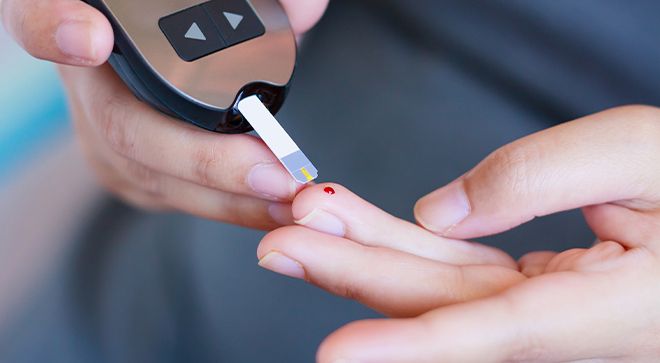Diabetes Increases Mortality Risk for Long-Term Cancer Survivors
Long-term cancer survivors experience diabetes at similar rates as individuals who are cancer-free, but cancer survivors with diabetes face a potentially higher risk of death, researchers have found.

A population-based study of nearly 7,000 long-term cancer survivors found that diabetes among long-term cancer survivors “was associated with cancer site, older age, lower education, higher socioeconomic deprivation, higher body mass index, physical inactivity, other comorbidities, and poorer prognosis,” with cancer survivors who also have diabetes facing a risk of death that is 29% higher than that faced by survivors who do not have diabetes, according to a study published in the journal Cancer.
The study, conducted by a team of German researchers, drew on information from 6,952 long-term cancer survivors who had received diagnoses of breast, colorectal or prostate cancer between 1994 and 2004, were recruited for participation between 2008 and 2011 and were then followed until 2019, with 962 (13.8%) of long-term cancer survivors reporting that they had diabetes at the start of the study and 1,828 cancer-free individuals serving as controls in the study.
While the study found that diabetes was as prevalent in cancer-free participants as it was among long-term cancer survivors who had survived at least five years after receiving their diagnosis, researchers were sure to put those findings in context.
“We want to stress that our finding of no increased prevalence of (diabetes) in (long-term cancer survivors) should not be interpreted as an indication of a lower risk of (diabetes) in this population,” researchers wrote. “Rather, it highlights the potentially poor prognosis in cancer patients with diabetes and survivors, and the need for an improved care to reduce the risk of (diabetes) and its consequences in cancer patients and survivors.”
Writing in Cancer, researchers noted previous work which showed that as much as a third of cancer survivors live with concurrent diabetes and explained that diabetes can impact cancer survival due to vascular complications, promoting cancer progression and metastasis and inducing therapy resistance.
The researchers stated that their findings display the need for improved communication and coordination of care between specialists and general practitioners to support continuity of care for patients.
“Individuals with type 2 (diabetes) experience an increased risk of all‐cause mortality compared with those without (diabetes), which is attributed to a wide range of cardiovascular or non-cardiovascular diseases (e.g., ischemic heart disease, stroke, chronic renal disease, chronic obstructive pulmonary disease, pneumonia, liver cirrhosis, viral hepatitis, incident cancer),” researchers noted. “The increase of mortality in cancer survivors with concurrent (diabetes) is also likely to be related to the increase of potentially fatal events from diabetic complications.
This may be the major cause that a roughly 30% increased risk of death was observed to be associated with (diabetes) in our study.”
These findings are the latest data reported throughout 2023 regarding poor outcomes experienced by patients with both diabetes and a history of cancer.
Diabetes was among the modifiable chronic health conditions cited alongside living in a socioeconomically disadvantaged area as contributing to an increased risk of death at least five years after diagnosis for childhood cancer survivors in a study published in JAMA Network Open, while a study published in Diabetologia showed that older patients with type 2 diabetes saw a 1.5-fold increased risk of mortality from colorectal, pancreatic, endometrial and liver cancers.
A study published in Cancer showed that immunotherapy treatment with Keytruda (pembrolizumab) is not as effective among patients with both metastatic non-small cell lung cancer and preexisting diabetes), while other research published in the same journal linked diabetes to poor survival outcomes among patients with colorectal cancer who undergo surgery.
Furthermore, a study published in Blood showed survival outcomes for patients with multiple myeloma to be worse of those patients also had diabetes.
Speaking with CURE® earlier this year, Dr. Brandon Blue, a clinical instructor in the Department of Malignant Hematology at Moffitt Cancer Center in Florida, stressed that for patients with cancer who are co-managing other conditions, clear communication with their care team is crucial.
“Be vocal to your doctor and let them know that you have diabetes and (make sure) that your doctor is aware of it, first of all,” Blue advised. “Because sometimes, as cancer doctors, I must admit, we get so entangled about the cancer and treating the cancer, sometimes we forget some of the other diagnoses that these patients have.”
Blue also said that “as a patient, you have to be kind of your best advocate to make sure that you actually are checking your blood sugar. … We give people so much information about chemotherapy and all the side effects of those things that sometimes people forget about their blood pressure medicines or their diabetes medicines, just because the chemo and the cancer is really the scary thing and the big thing on the front of people's minds. And so, I don't want people to forget about some of these other issues, because clearly it states in this study, that diabetes does matter.”
For more news on cancer updates, research and education, don’t forget to subscribe to CURE®’s newsletters here.